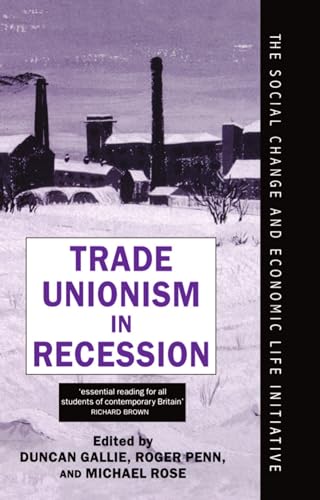Verwandte Artikel zu Trade Unionism in Recession (Social Change and Economic...

Inhaltsangabe
During the 1980's, British trade unionism confronted its greatest challenge, and suffered its greatest reverses, since the inter-war period. After a decade of rapid growth, the unions experienced a steep decline in membership, and a virtual marginalization in national political affairs. By 1990, a united, self-confident, social movement as well as a powerful industrial bargainer, often seemed more closely akin to a demoralized collection of special interest groupings.
This book addresses a number of fundamental questions raised by the record of these years. It examines the reasons for membership loss and the implications for trade union influence in the workplace. It looks at the steps the unions took in reaction to the membership problem and the difficulties they confronted doing so. It also looks at whether this period can be seen as making a fundamental break with the past, resulting in irretrievable loss by British trade unionism of its former important position in British society and the British workplace, or whether the past decade has been but a temporary recession and the future can still see revived movement.
Die Inhaltsangabe kann sich auf eine andere Ausgabe dieses Titels beziehen.
Von der hinteren Coverseite
During the 1980s, British trade unionism confronted its greatest challenge, and suffered its greatest reverses, since the inter-war period. After a decade of rapid growth, the unions experienced a steep decline in membership, and virtual marginalisation in national political affairs. By 1990 a previously united, self-confident social movement, as well as a powerful industrial bargainer, often seemed more closely akin to a demoralised collection of special interest groupings. This book raises a number of fundamental questions raised by the record of these years. It examines the reasons for membership loss and the implications for trade union influence in the workplace. It looks at the steps the unions took in reaction to the membership problem and the difficulties they confronted in doing so. It also looks at whether this period can be seen as making a fundamental break with the past, resulting in an irretrievable loss by British trade unionism of its former important position in British society and the British workplace, or whether the past decade has been but a temporary recession and the future can still see a revived movement.
„Über diesen Titel“ kann sich auf eine andere Ausgabe dieses Titels beziehen.
EUR 8,01 für den Versand von Vereinigtes Königreich nach Deutschland
Versandziele, Kosten & DauerNeu kaufen
Diesen Artikel anzeigenEUR 5,74 für den Versand von Vereinigtes Königreich nach Deutschland
Versandziele, Kosten & DauerSuchergebnisse für Trade Unionism in Recession (Social Change and Economic...
Trade Unionism in Recession (Social Change and Economic Life Initiative) [Hardcover] Gallie, Penn Rose; Rose, Michael and Penn, Roger
Anbieter: Hay-on-Wye Booksellers, Hay-on-Wye, HEREF, Vereinigtes Königreich
Zustand: Very Good. The slightest of shelfwear to extremities of dustjacket, otherwise fine. Artikel-Nr. 139237-5
Anzahl: 1 verfügbar
Trade Unionism in Recession (Social Change and Economic Life Initiative)
Anbieter: Ria Christie Collections, Uxbridge, Vereinigtes Königreich
Zustand: New. In. Artikel-Nr. ria9780198279204_new
Anzahl: Mehr als 20 verfügbar

